
Monday, October 19. Lunch With Max. Dinner At Union Square Café. I had breakfast in the hotel, thinking it would be something like the Marriott Courtyard's breakfast back home. It was much, much less than that. The kind of place where only people on the run, those who had to eat urgently, could possible accept.
I finished writing a newsletter just in time to take a subway downtown to meet my old friend Steve Singer. He currently works for a design firm run by a woman who was the original art director for Food and Wine Magazine. I remember it well back then, before American Express bought it. I impressed her by remembering the typeface the magazine used then. (Sometimes my geekiness about stuff like that comes in handy.) We talked about the demise of Gourmet Magazine. She said the offices have been cleared out and it was over. I said that I did not believe that Gourmet would just disappear, and even ventured the opinion that it wouldn't miss a single issue.
She brushed that off and gave us a tip about where to have lunch. "Let me make reservations for you at Tre Dici," she said. I told her we were just going to walk over there immediately. But she insisted on making the reservations anyway, to get some goodwill from the owner of the place, or points on Open Table, or something like that.
Tre Dici? Unless I'm misunderstanding an idiom, that means "Speak three times." I imagined having to repeat everything to a gruff waiter. In fact, the sleek dining room was staffed by beautiful young women baring the kind of cleavage that dared one to either look at or ignore. I was glad that a woman had chosen this place, so I wouldn't feel like a voyeuristic male pig.
By contrast, Steve looked about the same as I remembered him, taking into account the effects of the passing decades. The biggest difference was that he wore earrings and unusual glasses, but he always was much closer to the cutting edge of style than most people I know. And he's an artist. His description of his current life--"Could be better, could be worse"--seemed about right. He was a little bothered by the fact that he's worked in the same office for seven years, although he seems to like the situation. I told him that I've had the same job for twenty-one years--but he said he'd expect that of me. We unloaded our various pleasures and regrets. If I understood him correctly (and I'm not sure I did), he seemed to be saying that he wished he'd stayed in New Orleans. But he's from Atlantic City originally, and has a decidedly Northeastern outlook on life. And he's sixty-four. He and his wife have a rent-controlled apartment on the Lower West Side. So life can't be too terrible.
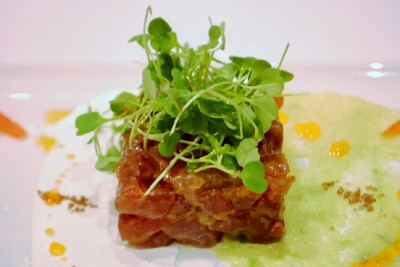
Lunch was good. I started with tuna tartare, served brilliantly with two sauces spread thinly on the plate. Then pumpkin ravioli, which the waitress said had just been added to the fall menu. She also knew that everything was made in house, from the pasta to the bread. "The chef has pumpkins back there right now that he's cutting and pureeing for the ravioli." It certainly seemed that way. Steve had a panini of fresh tuna which he said was terrific.
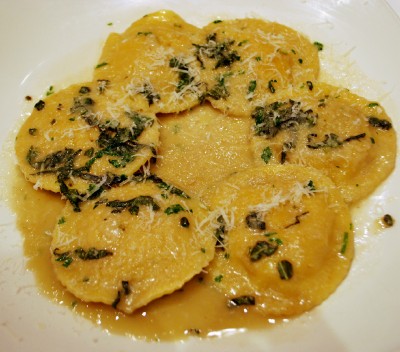
We compared notes about mutual friends. Quite a few of them had wound up in New York, especially after the hurricane. I was surprised by the fates of a few of them. One--a brilliant photographer who I'd been trying to contact for photos I could use in my book--is beset by some pretty deep physical and mental problems. Others were doing better. Still, this conversation left me a little bummed out. The people involved were from a glowing, youthful time in our lives. That's what happens when too many years intervene.
I walked with Steve back to his office. It's across the street from the Fashion Institute of Technology, where Mary Leigh spent a month taking classes in the summer of 2008. She relished that experience, but she left it certain that she didn't want to live in New York. Not even after she and Mary Ann spent the month in a very nice apartment a block away. But the Fashion District is a bit raffish, and raffishness is not to the Marys' tastes.
The day had dawned cold but with a blue sky, and now it was easily nice enough for me to walk all the way back to the hotel. The straight line took me right through Times Square. The renaissance of that recently-disreputable neighborhood has been cause for celebration in New York. It registered to me as disgustingly dirty and run-down as little as twenty years ago, but has improved with every visit. Now about the only thing that gives me pause is the extent to which the chain restaurants have taken over the neighborhood. Red Lobster, Bubba Gump's, TGI Friday's, and that ilk are all here with very large, showy restaurants. If New York's most famous, glittering intersection can't keep these bastions of ordinariness at bay, what place can?
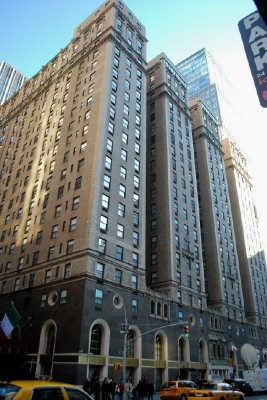
Just past Times Square, I found a place I've wondered about for a long time. On my first visit to New York--my high school senior trip in 1967--we stayed in the Taft Hotel, a grandiose old palace. By then, however, it had descended two or three ranks. Its name was gone by the 1980s, when I tried to stay there for the sake of nostalgia. I couldn't even find out where it was, and wondered whether it had been torn down. It hasn't. It's called the Michelangelo Hotel now, and it's supposed to be pretty good. I walked around it and entered the lobby, looking for anything to fire off a spark of recognition. Nothing. They renovated too deeply for memory to survive.
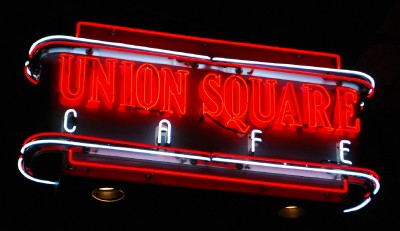
I took a long nap, then took the subway down to Union Square, there to meet Ann Lee and Chris Conway. They're from Santa Rosa in Sonoma County, and in the wine business in a small way. They are also great lovers of New Orleans, and visit several times a year, mainly for the purpose of eating. My kind of people.
Ann and Chris are personal friends of a chef at the Union Square Cafe, one of the string of restaurants owned by Danny Meyer and associates. Meyer is one of the leading restaurateurs of the new school, highly regarded by both diners and other food people. I was a couple of minutes early, but Ann and Chris beat me there, and were having cocktails in the bar. They greeted me with a nice gift: a book about Delmonico's, the first real restaurant in America. Founded in 1837, Delmonico's created such a sensation that it was copied everywhere else in America. For a time, there was a chance that what we now call a restaurant might have been called a delmonico instead.
As soon as I saw the book, it hit me that I should have planned a dinner there. The current Delmonico's is in the original location in the financial district. But its history has been punctuated by closings, other locations, and many owners. Still, one of these days I want to write a book about such ancient restaurants, which I find tremendously interesting. (It helps that New Orleans has more of them than any other American city.)
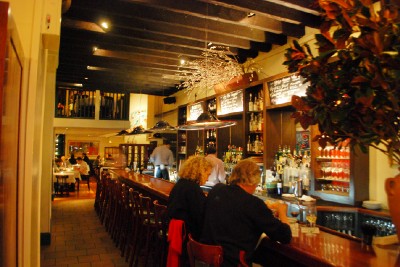
But back to the present. The crowd at Union Square was youthful, excited, and convivial, with a service staff to match. The restaurant categorizes itself as American, but it's heavily influenced by the Italian style. The first two courses course at our table, for example, included fried calamari and two pasta dishes. Pappardelle pasta with wild mushrooms showed up at my place. Atop it was a poached egg, creating the sauce for the thick pasta ribbons when it was cut into. I went straight to the entree from there, with a pair of lamb chops so luscious that I neglected to take a photo of them.
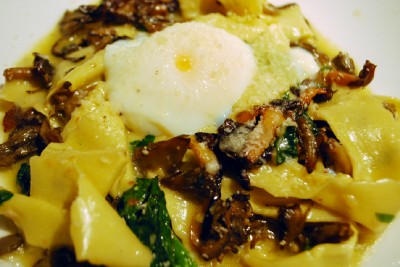
It turned out that the chef friend of Ann and Chris was not in the restaurant that night. And here we were thinking we were getting special service! It came from a sharp, aware, young woman who was totally hip to the food and the style of the place. This, I decided, is the main advantage New York has over New Orleans. We surely have restaurants that could turn out this kind of food--or any food I'd had anywhere else in Gotham, except perhaps in its most expensive restaurants. But we don't have many service people if the caliber that is routine around New York. Why? Because these people are educated, and our people aren't. If only we could make the population understand this, we could get somewhere with this old problem. But the citizens of New Orleans are too poorly educated to understand what a disadvantage it is to be poorly educated.
Chris, Ann and I bade each other farewell until we met again on the ship. I took the subway back to the hotel and packed it in at around midnight. I don't know whether I will have lunch with Leslie Stoker, my publisher. If I do, it will be a very hectic day.